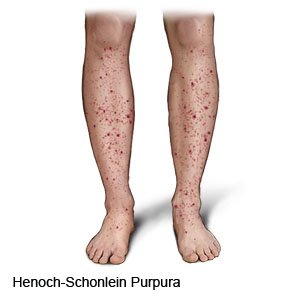Henoch-Schonlein Purpura
Medically reviewed by Drugs.com. Last updated on Aug 4, 2025.
What is Henoch-Schonlein purpura?
Henoch-Schonlein purpura (HSP) is a condition that causes your immune system to attack and damage your blood vessels. Damage to your blood vessels causes them to swell and bleed. HSP most commonly affects the blood vessels in your skin, joints, intestines, and kidneys. HSP can happen at any age but is most common in children 2 to 11 years of age. HSP may eventually get better or become a chronic condition.
 |
What increases my risk for HSP?
- Viral or bacterial infections such as measles, chickenpox, or strep throat
- Certain vaccines such as the flu vaccine
- Certain medicines such as antibiotics or aspirin
- Allergies to insect bites, chocolate, milk, or wheat
- Living in cold weather
- A family history of HSP
What are the signs and symptoms of HSP?
A purple rash (purpura) is the most common sign of HSP. The rash may feel bumpy. The rash may first appear on your legs, arms, or buttocks. It may spread to your chest, back, or face. You may also have any of the following:
- Fever
- Headache
- Nausea, vomiting, diarrhea, or abdominal pain
- Blood in urine or bowel movements
- Pain and swelling in one or more joints
- Swelling of the testicles in male children
How is HSP diagnosed?
Your healthcare provider will examine your skin and ask about your symptoms. You may need any of the following:
- Blood and urine tests will show your kidney function and give information about your overall health. These tests may also check for infection.
- A sample of your bowel movement may be tested for blood or infection.
- A skin biopsy may be done to test your skin for antibodies.
- A kidney biopsy may be done to check your kidney for antibodies or blood vessel damage.
- Other tests may be done to check for health problems caused by HSP. This may include an ultrasound of your abdomen to check for blockages in your intestines.
How is HSP treated?
There is no treatment for HSP. HSP may eventually go away or become a chronic condition. You may need medicine to manage your symptoms. This may include medicine to decrease swelling, pain, or fever. It may also include medicine to stop your immune system from attacking your blood vessels.
Related medications
What are the risks of HSP?
Your kidneys may be damaged if HSP attacks the blood vessels in your kidneys. The damage may get better with treatment or may lead to kidney failure. HSP may cause your bowel to fold into itself and become blocked. You may need surgery to fix this problem. HSP can cause life-threatening bleeding in your intestines or brain. Women with a history of HSP are at risk for high blood pressure and kidney problems during pregnancy.
How can I manage my symptoms?
- Apply ice on your joints for 15 to 20 minutes every hour or as directed. Use an ice pack, or put crushed ice in a plastic bag. Cover it with a towel. Ice helps prevent tissue damage and decreases swelling and pain.
- Apply heat on your joints for 20 to 30 minutes every 2 hours for as many days as directed. Heat helps decrease pain.
- Elevate your joint above the level of your heart as often as you can. This will help decrease swelling and pain. Prop your joint on pillows or blankets to keep it elevated comfortably.
- Drink plenty of liquids as directed. Liquids help prevent dehydration from vomiting or diarrhea. Ask how much liquid to drink each day and which liquids are best for you.
- Rest as directed to help your body heal. Ask your healthcare provider when you can return to your normal activities.
Call 911 or have someone else call for any of the following:
- You have a seizure.
- You have trouble breathing.
When should I seek immediate care?
- You are confused.
- You have a bruise that suddenly gets bigger.
- You feel dizzy or weak.
- Your abdomen looks bigger than usual and is very painful.
- You vomit blood or liquid that looks like coffee grounds.
- You stop urinating or urinate a lot less than usual.
- You have swelling in your face, arms, or legs.
When should I contact my healthcare provider?
- You have a fever.
- You have blood in your bowel movements or urine.
- You cannot stop vomiting.
- You have questions or concerns about your condition or care.
Care Agreement
You have the right to help plan your care. Learn about your health condition and how it may be treated. Discuss treatment options with your healthcare providers to decide what care you want to receive. You always have the right to refuse treatment. The above information is an educational aid only. It is not intended as medical advice for individual conditions or treatments. Talk to your doctor, nurse or pharmacist before following any medical regimen to see if it is safe and effective for you.© Copyright Merative 2025 Information is for End User's use only and may not be sold, redistributed or otherwise used for commercial purposes.
Learn more about Henoch-Schonlein Purpura
Treatment options
- Medications for Allergic Purpura
- Medications for Bleeding Disorder
- Medications for Henoch-Schonlein Purpura
Care guides
Further information
Always consult your healthcare provider to ensure the information displayed on this page applies to your personal circumstances.
